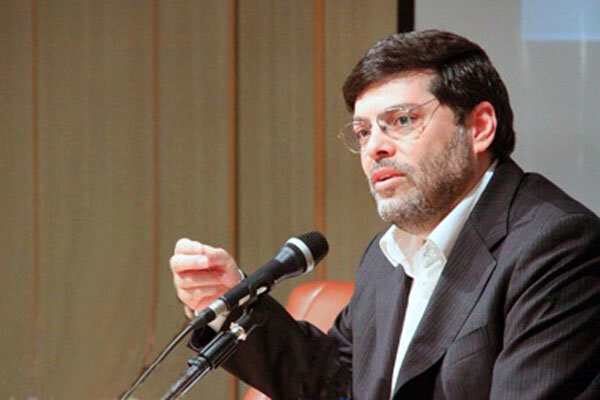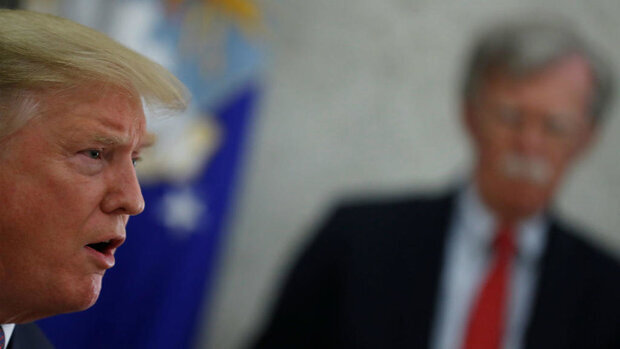TEHRAN – The US National Security Adviser, John Bolton, was forced out from the White House last Tuesday due to, as believed, his different stances from those of Trump on issues such as the US foreign policies towards specific countries including Iran.
Bolton himself said in a tweet that he had offered to resign Monday night while a few hours later Trump announced that he fired Bolton after a string of disagreements over how the US should handle North Korea, Afghanistan and Iran.
His downfall has been translated in many different ways, so far, regarding its influence on US internal issues and America’s worldwide ties.
Some believe, he had been elected by Trump to make his Presidential campaign promises and approaching the second round of elections, Trump, who is dipping to 39 percent approval in a new CNN/SSRS poll (only 36 percent of those asked said he deserved reelection), is turning his face towards new managerial strategies to feel more confident about his second tenure in office.
Bolton is not the first cabinet member leaving under Trump. He, for sure, was a big voice in Trump’s ear but his opposing voice made the US President angry.
When it comes to foreign policy issues, absence of Bolton, a man of hawkish impulses and a fan of military intervention, in the White House, as some expect, could be Trump’s green light for a holding talks with old adversaries to release global tensions besides taking a less tough stance towards them.
About Iran, Bolton, is said to have different opinions from Trump and Pompeo. ‘He believed in ‘Regime Change’ and military attack to the Islamic country and the US without him would be a more flexible one towards Iran,’ some expected naively.
Iranian officials have announced that there is no room for talks between Tehran and Washington with or without Bolton. Calling ouster of Bolton US’ ‘internal issue’, they rejected any idea of a meeting between Trump and Rouhani underscoring that as long as the US’s unjust sanctions and economic terrorism are being imposed on Iranian people, there is no possibility of talks and negotiations. 'The procedural changes in the US ruling body are not going to affect Iran’s perception of the US anti-Iran actions and policies,' Iranian officials reiterate.
Any optimism about Washington on possible changes in its policy toward Iran after Bolton was killed off when the US Treasury Secretary Steven Mnuchin said on Thursday that the US is still pursuing its campaign of "maximum pressure" against Iran, even after Trump parted ways with his hard-line national security adviser because the White House believes in it as a practical tool against the Islamic Republic.
Sanctions against Iran have been effective and could help pressure Iran and its leaders to negotiate with Trump, Mnuchin added.
Another proof for the US’ continuing tough stance towards Iran was provided when Trump admitted on Thursday that Bolton was not of very difference from him. “Frankly, he wanted to do things not necessarily tougher than me,” later adding that Bolton “wasn't in line with what we were doing, and actually, in some cases, he thought it was too tough what we were doing.”
In an interview with Mehr news agency, Mohammad Marandi, a professor at University of Tehran, shed light on the issue.

How can Trump's decision about Bolton be translated? regarding US foreign policies in general and about Iran in particular.
Obviously, Trump does not like rivals that is why that is so far, Pompeo, who is extremely obedient has had a better fate than that of Bolton. But I do not think that is going to have any impact on the policy of the US towards Iran. The only way for a major change to take place for the US is to recognize its obligations and abide by them within the framework of the JCPOA.
Is it a green light for holding talks with Iran?
Definitely, not! The mere way for the US is to end its maximum pressure campaign, its economic terrorism, and warfare against Iranian women and children and to compensate for the damages done. Only after the sanctions are fully lifted and the nuclear deal is fully implemented for a period of time can be contemplated such a situation.
The US is continuing its maximum pressure, while Trump is open for negotiations. What is your idea about that?
Well, that is exactly the problem. The US wants to be able to violate its commitments and then get something in return and that would be the most foolish thing for Iran to accept. The US should not be benefitting from hurting people and that would be both appeasement and it would only make things worse because it will encourage the regime in Washington to use the same tactics every time, they do not get what they want at the negotiating table with Iran. And the very fact that we have seen these constant changes in the language of the White House and its different voices and all this confusion in Washington especially the White House is itself a reason why we should not engage with such a regime that is not reliable, is inconsistent, and would use suffering to gain leverage.
What will be Iran's stance towards US? Is resistance the only option for the Islamic Republic? The US may take the upper hand persuading Europeans that it has taken a step forward for releasing tensions with Iran but it is Iran who escapes the negotiation table.
No, it is not Iran who has left the negotiation table. It is the US who has left the table. The US was at the negotiation table and was a part of P5+1, even under Trump his First Secretary State was negotiating with Iranians so they tore the agreement and left the table, tries to impose their will on other people so that they would not deal with Iran, such as the Europeans. The US is responsible for this situation. Simply removing one person from power like Bolton does not mean anything. It is not a concession. It is nothing. Iran does not even want concessions. Iran wants the US to abide by its commitments and obligations and until it does not so, the US will remain an unreliable regime for Iran. So, nothing has changed. The only thing that has changed is that the world sees more clearly how the US maximum pressure campaign has failed but Iranian resistance will continue until the US backs down and begins to behave reasonably and lawfully and as a normal country.
Can we say Iran has had a role in Trump's decision?
It is possible to say that Afghanistan, Iran, Venezuela, Yemen and also regarding some other issues, North Korea besides China and Russia had to do with Bolton’s downfall but at the end of the day I think Trump wants to be seen as the person in charge and Bolton does not make that easy for Trump.
Also, Bolton is not a person who is obedient to Trump and that has more to do than anything else, he concluded.
In practice, nothing has changed between Iran and the US after Bolton. The US persists in its maximum pressure policy against the Islamic Republic while Iran insists on practicality of 'resistance'. JCPOA, hammered to open gateways of cooperation between Iran and P5+1 after years of hard negotiations, may start to crumble in case its sides withdrew from fulfilling their commitments to it.


No comments:
Post a Comment